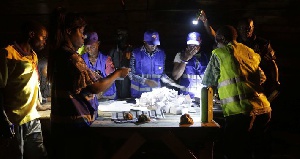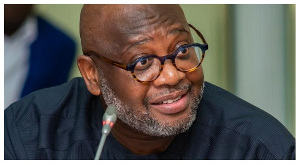It sounded like the denouement of Ghana’s nine-month-long political drama. At 2:00 on Friday morning, Joy FM, one of most popular radio stations in Accra, announced that opposition candidate Nana Akufo-Addo had won the presidential election with 53% of the votes against incumbent John Mahama on 45.2%. The radio station based its call on results from 218 of the country’s 275 constituencies.
Cheers erupted in the campaign team for the opposition New Patriotic Party (NPP), which had been urging the radio station to call the election.
In fact, Joy was the last of the big radio stations in the capital to announce that Akufo-Addo had built an insurmountable lead in the elections that ended on 7 December.
After looking at the data, Joy’s top journalists and analysts concluded that it was now “mathematically impossible” for Mahama to win the elections.
They have passed over their conclusions to the presidency for response. There has been no comment yet beyond by a tweet from President Mahama’s official account: “Let's allow EC [Electoral Commission] to carry out its constitutional mandate. We'll make Ghana proud no matter outcome.”
Although the radio stations and most of the private newspapers have called the election for the opposition, remarkably the EC had not announced a single certified result by midday on 9 December.
The EC’s timetable has been snagged by officials from the governing National Democratic Congress (NDC) refusing to sign results sheets in several constituencies.
That allowed the media, civic activists and opposition parties to fill the election data vacuum. And their figures were almost all pointing to a substantial opposition victory in the presidential and parliamentary vote.
How could they be so sure of the accuracy of their data? The answer is something of a triumph for activists and oppositionists. Under Ghana’s electoral system, party agents and independent monitors are allowed access to key voting data, polling station by polling station.

Recruiting efficient and determined monitors and polling agents was the first step in crunching the numbers. Then some innovative information technology was brought in, with organisations setting up data systems linking all 275 parliamentary constituencies to report on results from the nearly 29,000 polling stations across the country.
Leading the field among them was the opposition NPP. Its presiding genius is director of technology Joe Anokye, a Ghanaian expert on data systems who has been working for the NASA space agency for the past two decades.
Anokye has been working on building an electoral data system for the party — at a secret location in Accra – since March. “The first step was recruitment,” he tells The Africa Report. “We had to have two reliable and technologically capable agents for each of the 29,000 polling stations in the country.”
In previous elections, many of the party’s agents had walked off the job or taken money to certify false results.
But this time, the party treated the agents much better: the quid pro quo was that they had to report with total accuracy the results in their local polling station, the number of votes cast and any possible disputes.
Anokye and his team built a system that allows the agents to feed their information into the party’s national database in real time so party officials in Accra could know the results at each polling station as soon as they had been announced. At the same time, the party had its own data experts in each of the 275 constituencies tracking the results polling station by polling station.

It has assigned one data expert to the EC’s collation centre for the constituency, and the other runs a collation centre for the party in each constituency. That enables the party to compare its own figures with the results in the commission’s system. To the NPP's relief, most of the results matched.
That has informed the NPP’s early insistence that it had won the elections, a view now widely shared in the media and civil society, and even by the more discreet members of the governing NDC.
Others NDC loyalists are still questioning some of the figures and holding up the official announcements.
General News of Sunday, 11 December 2016
Source: theafricareport.com

















